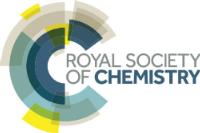The Congress will reflect the diversity of science and research that can help solve challenges of food security and progress towards sustainable agriculture, with a focus on the chemical sciences. The conference will give all participants the opportunity to engage with other scientists, hear about cutting edge research and policy and exchange ideas. Previous events have led to new collaborations and partnerships across Africa and the globe.

In 2011 the PACN Congress was held in Ghana to explore “Agricultural Productivity: How the Chemical Sciences Can Help to Feed the World”, and this led to the publication of a Policy Report. Building on this, PACN now wants to bring the community together once again to look at the progress that has been made, and the new challenges faced by African agriculture, especially with ongoing climate change.
This year's Pan Africa Chemistry Network Congress Sustainable Agriculture; How the Chemical Sciences Can Contribute to Food Security for a Growing Population will take place in Accra, Ghana and is expected to attract 200-300 delegates from Africa, UK and globally, including many leading researchers and policy-makers, to discuss current research, challenges, new developments and crucial issues on the topic of Sustainable Agriculture.
There will be 4 themes covered in the scientific sessions:
- Chemistry for Crop Protection: To protect crops from pests and other degradation. This will include strategies for crop protection, chemicals for crop protection, including natural product chemistry and/or green approaches to manufacture. This could include ways to increase on-farm yields and issues of storage and transport, as well as topics around regulation and policy, environmental impacts and the use of banned chemicals.
- Crop and Soil Nutrition: Ways to ensure optimal growth of crops. Fertilisers, land management and soil science are all vital to this. We will discuss soil health, soil protection, mapping and monitoring, as well as sustainable ways to improve soil resilience and soil quality. We will also cover research that seeks to understand the dynamic natural processes that take place in ecosystems to use or regenerate the nutrients needed by crops.
- Sustainable Agriculture for Economic Development: The Case of Cocoa: Cocoa is Ghana’s principal agriculture export, with annual exports valued at $2.59b (OEC 2015) and so it is vital for many African economies that cocoa production is efficient and sustainable. We will discuss the challenges faced by the cocoa industry and innovation from the chemical sciences which will benefit the industry and its communities into the future.
- Future Farming: How to ensure a nutritious food supply for a growing population. This will include the challenges of climate change and the demand for land for non-food crops. We will discuss ways that science can make agriculture more sustainable through climate- smart- crops and crop management as well as ways to increase resilience. This session will also cover ways to ensure the that the food supply is nutritious, and contains the micro and macro nutrients needed for health.
PACN will also look at how sustainable agriculture can impact on the economic growth of African countries, many of which have been impoverished by the shift from agriculture to other economic activities such as mining and oil exploration which are having negative impacts on their environments.
Please read more and register here.


